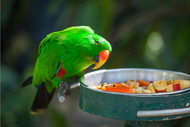Can Parrots Eat
Posted by Parrot Diet, Parrot Health, What Can Parrots Eat, Parrot Treats, Parrot Nutrition, What do Parrots eat, on 10/4/2025
This is what Parrots can and cannot eat.
Can Parrots eat?
Chicken
While some Parrot species in the wild may consume small insects or occasional small vertebrates, their primary diet doesn?t include meat.
Parrots are classified as herbivores or omnivores, depending on the species, with the majority of their natural diet consisting of fruits, seeds, nuts and vegetation.
Avian vet Sheryl Calway said: I don?t have any concerns about feeding Parrots chicken as they are omnivorous in the wild (so would eat animal proteins).
However, the amount to be fed and frequency depends very much on what the rest of the diet consists of and how much exercise the bird gets, plus their general health status.
Tomatoes
Tomatoes should be given to Parrots in moderation and with certain precautions. Tomatoes are part of the nightshade family, and the leaves and stems of the plant contain a toxic compound called solanine.
However, the fruit itself, including the ripe tomatoes, is generally safe for Parrots to consume in small amounts. Tomatoes are a good source of Vitamins A and C, as well as antioxidants.
Chocolate
No, Parrots should not be given chocolate. Chocolate contains theobromine and caffeine, which are toxic to birds and can be potentially fatal if ingested in sufficient quantities. These substances can negatively affect a Parrot's cardiovascular and central nervous systems.
Cheese
While Parrots can technically eat small amounts of cheese, it?s not recommended as a regular part of their diet. Cheese is high in fat and lactose, which can be difficult for Parrots to digest.
Additionally, Parrots have different nutritional requirements than mammals, and their digestive systems are not adapted to process dairy products. Feeding a Parrot a diet high in cheese or other dairy products can lead to digestive issues, such as diarrhoea or an upset stomach
If you want to offer your Parrot a small taste of cheese as an occasional treat, make sure it is low in salt and does not contain any added flavours or seasonings.
Grapes
Yes, Parrots can eat grapes, and many Parrots enjoy them as a tasty and nutritious treat. Grapes are a good source of hydration and contain essential vitamins and minerals, including Vitamin C and potassium. When offering grapes to your Parrot, ensure they are thoroughly washed and preferably seedless.
Cut them into small, bite-sized pieces to make it easier for your Parrot to eat. Remember that grapes are high in natural sugars, so offering them sparingly is important to prevent excessive sugar intake.
Mango
Mangos can be a delicious and nutritious treat for Parrots. They are rich in vitamins and antioxidants. Just make sure to remove the pit and peel the skin before offering it to your feathered friend. Cut the mango into bite-sized pieces to make it easier for them to eat.
Other foods your Parrot can eat include bananas, apples, carrots, broccoli, quinoa, leafy greens and berries.
Avocado is poisonous to your Parrot and should never be given to them.
Rosemary Low outlines vegetables that are safe for your Parrot to eat here and Sophie tells us about safe seeds here.
Our simple nutrition plan outlines the best diet for your Parrot here. Pellets should be approximately 60% of your Parrot's diet, 10% should be seed and treats and the remaining 30% fruits, nuts, vegetables and anything else they like to eat.
It may need time and patience to convert your Parrot to a new food. The late Liz Wilson explained how to do it here.
See lots of delicious food for your Parrot here

